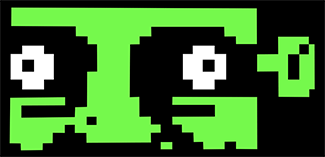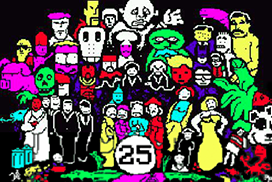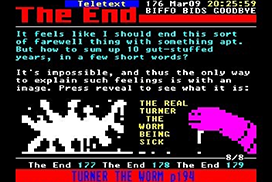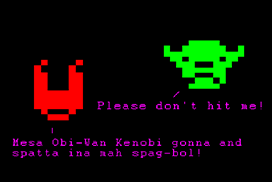
Page 28, press hold, and reveal. Digitiser's founder speaks out

|
The games industry can eat shit and die
Edge #124, June 2003
We all know what corprophagy is, right? It's a Greek word meaning 'to eat shit'. Interestingly, I once heard a tale about a rock guitarist who, for a bet, had attempted to eat shit. Apparently, as it had already been through a digestive system, his saliva had trouble breaking it down. So it was near impossible to swallow, and he ended up having to pick it out of his teeth, and scrape it off his tongue with a guitar pick (apologies if you were eating a Snickers while reading the above).
What has such vivid imagery got to do with the world of videogames? On one level, nothing. To the best of my knowledge, few of us are happy to scoff human waste. Unfortunately, that doesn't mean that we're not force-fed recycled, reheated shit with alarming regularity. And when you eat poo, it's going to come out the other end sooner or later. And, alas, there always seems to be somebody ready with knife and fork, and the cycle begins anew.
We're all blessed with imaginations. Within us all there's a child who was once capable of turning a dining table into a fort, or a branch into a gun, or a pillow into a sentient cloud-friend called Mr Nimbus. So it pains this writer to see so many imaginations reclining, dormant, and rusty, in their owners' brainpans. Heck, why spend a couple of extra hours trying to come up with a few new ideas when you can just cobble together something from what's gone before, right? Why expend any time and energy trying to come up with your own concepts, when plenty of guys have already done so and - suckers - made their ideas available for all to see?
Once upon a time every videogame was a window on a new world. Oh, sure, back in the '80s we had countless inexplicable 'tributes' to Donkey Kong, and your subtly renamed Space Invaders and Pac-Man rip-offs (Mr Puck, The Invaders, Astro Wars, et al). But every game that mattered - and there were scores of them - did something different. Nowadays, the games that we're told should matter are the ones with the most hype, or the ones with a licence - not the ones displaying the most evidence of an original imagination.
See, something weird happened back in the mid-'90s; the games industry started feeding upon itself. There's a Native American legend about a snake - Oroboros - that did much the same thing. Nobody knows why. Perhaps it was an idiot.
We can all complain about how unoriginal the industry is until we're blue in the chest. But the fact is that a multitude of unoriginal sins could be forgiven if only designers displayed a smidgen of original thinking. I'm not even talking about gameplay; sometimes I do want to know that I'm going to feel at home with my thirdperson, 3D platform game. Sometimes I want that familiar button layout, that same old collect-100-objects-to-get-a-new-life mechanic. Similar types of games are often going to play similarly. If Capcom suddenly presented us with a radical reinvention of the Resident Evil franchise, I'd probably shriek into my shoe.
What I'm talking about is the worlds these games inhabit, and the characters who inhabit them. Why must all of them feature a checklist of gaming's greatest hits? If I witness another exploding barrel (do real barrels explode if you hit them with a stick? And how often do you see a barrel in real life anyway?), or another mine cart, or another door that opens only if you push a huge granite cube onto a switch, I'm going to stab myself in the face.
If you're going to be unoriginal at least disguise it. Make the mine cart a big roller skate, or the exploding barrel a giant moth strapped with dynamite or something. Please! Is it really that difficult? Do you really think our memories only extend to the past couple of weeks, and we'll forget the last time we jumped across a lake of lava? We're not goldfish, people! We're people!
With but a few exceptions, films all follow the same structure. Yet what filmmakers have become adept at is hiding the three-act template that films must adhere to. Imagine if every film Hollywood produced was set in Leeds, and featured half a dozen or so identical scenes in which the main characters, who all wore identical blue jumpsuits, discussed skin care products.
Sure, there are only about four stories in the world when you boil them down to the basics, and all that, but at least Hollywood scriptwriters are smart enough to hide the fact that they're cribbing from their predecessors (unless they're the two gents who did 'Godzilla'/'Independence Day'/'Stargate', who might as well have named their company 'We Really Like George Lucas and Steven Spielberg Films Ltd').
We're currently in the midst of a platform game resurgence, and so all the old clichés are being marched out with tedious regularity; snow levels, levels with Aztec-esque ruins, those poxy lava levels, underground flipping caverns by the ton... even the sublimely structured and otherwise brilliant Metroid Prime is riddled with these same clichés. Heck, it even lifts Half-Life's hooked tentacles, and Resi's giant plant thing. It's like the time a decade ago when every single side-on platform game had to have a level where you were arsing about on the roof a train - and it's getting worse. For me the final straw was the rolling barrels in the risible Star Fox Adventures; a homage to Donkey Kong, or the low watermark of this industry's imagination?
Without wanting to sound like an old fart, back in the '80s we had games starring murderous infants (Jack The Nipper), cheeky schoolboys (Skooldaze), and hell-spitting camels (thank you, Mr Minter), set anywhere from a curiously domestic nightmare world (Pyjamarama), or Thatcher's Britain (Urban Upstart), to a sprawling mansion set on the morning after a grand piss-up (Jet Set Willy). But even recent history has displayed moments of genius. It's easy to take Sonic's chequerboard, pinball world for granted, but back at the dawn of the '90s it was truly unique.
It's crucial to the survival of the industry that developers start working harder, and being in less of a hurry to get down the pub during the early days of a project's life. If gamers are forced to take the same trip to over-familiar locales, sooner or later we're going to stop getting on the bus in the first place.
Developers: before you start working, hide your consoles for a month. Go to the cinema. Read some books. Watch kids' TV. Look at the illustrated abdomens of tattooed fun fair workers. Forget every game you ever played, and draw your inspiration from elsewhere. Dig deeper. There are tasty treats to be found in places other than Shigeru's toilet.
Mr Biffo is a semi-retired videogame journalist. His views do not necessarily coincide with Edge's
Do you know of any important moments from the annals of Digi history that have been omitted? If so, then mail me (superpage58@gmail.com) right now, man. Credit will be duly given for anything that gets put up.










